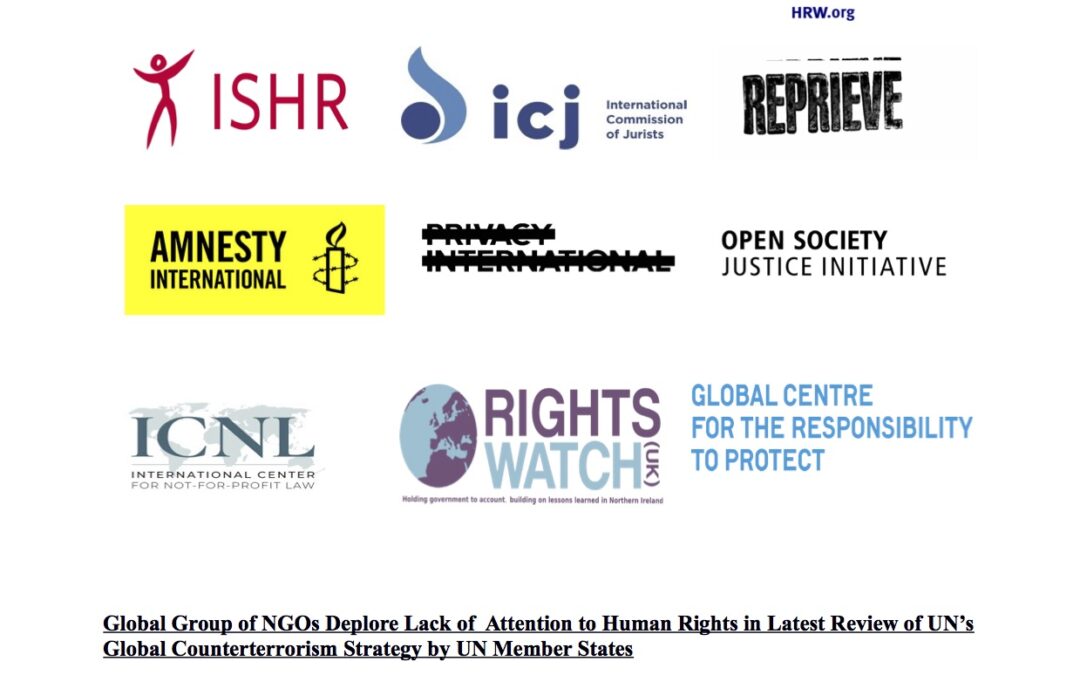
Jul 11, 2018 | Advocacy, Non-legal submissions
The ICJ today joined other civil society organizations in calling for respect for human rights, and protection of and participation by civil society, to have a greater role in the UN Global Counter-terrorism Strategy.
The joint statement by the organizations followed adoption by the UN General Assembly on June 26th, 2018 of Resolution 72/284, reviewing the United Nations Global Counter-Terrorism Strategy. The UN’s Global Counterterrorism Strategy, first adopted in 2006, sets out a plan of action for the UN and member states at the global, regional, and national level to counter-terrorism.
The organizations emphasise the value of a global counter-terrorism strategy where human rights are an essential component. It notes that the General Assembly resolution importantly reaffirms states’ obligations to comply with international law, including international human rights law, while countering terrorism and that human rights are the “fundamental basis of the fight against terrorism.”
The joint statement expresses concern at States’ failure to adequately address human rights abuses in relation to counter-terrorism measures. It also sets out concerns about member states’ failure to provide an enabling environment for civil society entities, including those relating to women, to be meaningfully engaged in the Strategy review.
The full statement and list of organizations joining it can be downloaded in PDF format here: UN-Advocacy-JointStatement-CounterTerrorismStrategy-2018
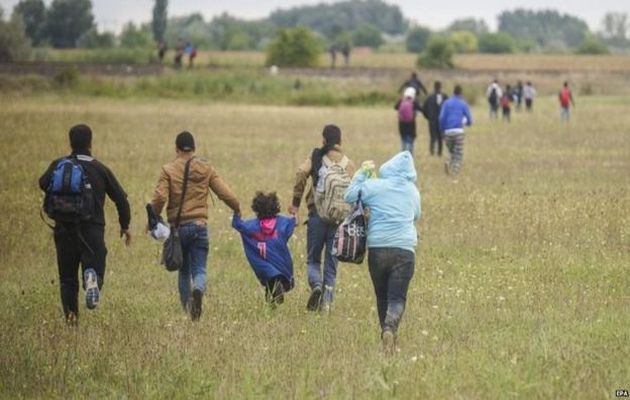
Jul 10, 2018 | Advocacy, Non-legal submissions
The ICJ has joined almost 180 other organizations in calling for the final draft of the UN Global Compact on Migration (GCM) to reflect strong legal protections for human rights.
Recognizing the potential of the GCM to protect migrants in irregular and/or vulnerable situations, civil society organizations are calling on all States to ensure that the final document truly lives up to the spirit of the New York Declaration for Refugees and Migrants.
The statement was presented to Member States and the GCM Co-Facilitators (the governments of Switzerland and Mexico) in an informal dialogue on Tuesday, 10 July.
The statement calls on States to address the following issues:
- Regular vs. irregular: The GCM must not include a distinction between migrants with regular status and those whose status is irregular which falls below human rights law, international labor standards and other international obligations.
- Non-Refoulement: The GCM must explicitly mention the principle of non-refoulement, which prohibits returning a person to a place where her/his life would be in danger. Including it is fundamental to ensure that migrants are provided with full live-saving protection.
- Vulnerable situations: The GCM must address the situation of vulnerable migrants, and it must not weaken protection for victims of natural disasters and climate change, who are not adequately addressed in the Global Compact for Refugees.
- Right to privacy: The final document must protect migrants’ right to privacy of personal information. Otherwise, the GCM risks preventing them from accessing certain social services and discouraging them from participating in data collection efforts, which are vital for migration management.
- Criminalization of migrants and those who assist them: The GCM must avoid all provisions and language that criminalizes migrants crossing an international border in search of safety or of people and organizations that support to them.
- Detention of migrant children: The GCM must include provisions towards ending the practice of detaining migrant children by explicitly mentioning the availability and accessibility of non-custodial and community-based alternatives.
- Implementation, review, and follow-up mechanisms: The Compact needs robust implementation, review, and follow-up mechanisms to ensure accountability and transparency in achieving its goals. Civil society organizations ask for a fully mandated partnership role in implementation and monitoring the GCM.
To be effective, the statement concludes, migration management must be credible not only to States, but also to migrants.
The statement is available in PDF format here: UN-Advocacy-JointStatement-Migrants-2018
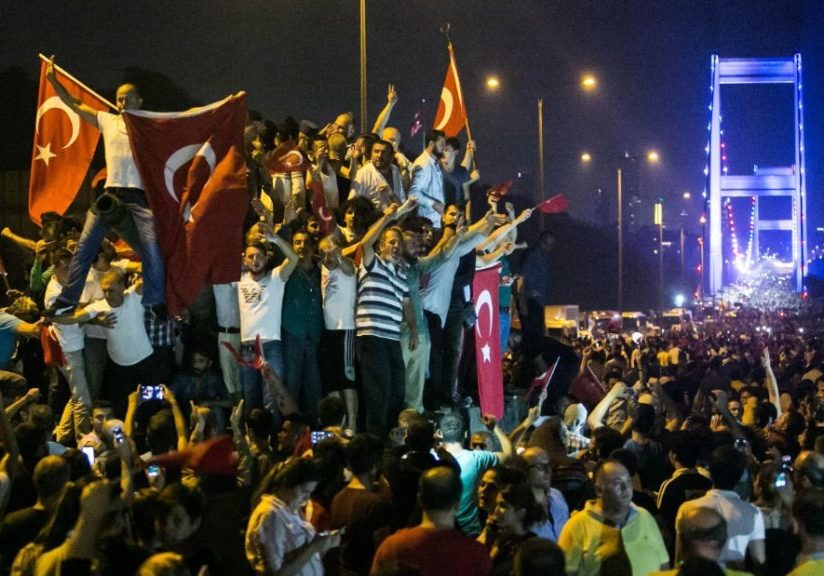
Jul 5, 2018
On 25 June, the ICJ and Human Rights Joint Platform (IHOP) filed their joint submission to the UN Committee against Torture (Committee).
The Committee will consider it during the adoption of a list of issues prior to reporting (LOIPR) for the examination of the Fifth Periodic Report of Turkey under Article 19 of the Convention against Torture and Other Cruel, Inhuman or Degrading Treatment or Punishment (CAT).
During its 65th session, from 12 November to 7 December 2018, the Committee will prepare and adopt a LOIPR on Turkey.
Once adopted, the LOIPR will be transmitted to the State party. Turkey’s formal response to the LOIPR will then constitute its Fifth Periodic Report under article 19 of the Convention.
The ICJ and IHOP’s joint submission to the Committee highlights a number of ongoing concerns with respect to the country’s implementation of and compliance with the provisions of the CAT.
In addition, the joint submissions formulates certain questions and recommends that the Committee should include them in its LOIPR and address them to the Government of Turkey, including on the following pressing issues:
- allegations of abduction;
- immunity from prosecution for torture and cruel, inhuman or degrading treatment or punishment;
- remedies and reparations for victims of torture;
- fundamental legal safeguards and access to a lawyer;
- conditions of detention;
- civil society organizations; and
- national human rights institution and national preventive mechanism.
Turkey-LOIPR-ICJ&IHOP-June2018-final (download the submission)
Turkey-LOIPR-ICJ&IHOP-June2018-statement-ENG
 This project is funded by the European Union
This project is funded by the European Union
* This article does not necessarily reflect the view of the European Union
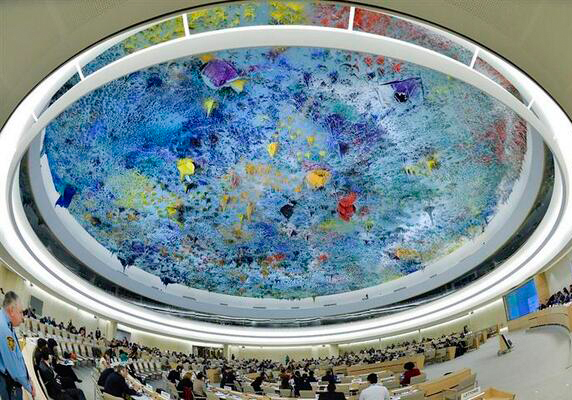
Jul 5, 2018 | Advocacy, Non-legal submissions
The ICJ today joined other NGOs in urging open discussion and debate about countries at the UN Human Rights Council in Geneva, including in discussions of cooperation, despite attempts by some States to interrupt and suppress debate.
The statement was delivered in a General Debate on items 2 and 10 of the Council, by Asian Forum for Human Rights and Development (FORUM-ASIA) on behalf of the group of NGOs. It read as follows:
“Thank you, Mr. President. While we appreciate the importance of technical cooperation, we wish to stress that a debate on technical cooperation will be incomplete if it does not address non-cooperation and country situations that have worsened despite technical cooperation. We are alarmed by efforts to restrict discussion on such situations by some states under Agenda Item 10, including for instance by (the Bolivarian Republic of) Venezuela earlier today.
While we recognise that all delegations including NGOs are required to speak on the topic under discussion, we are deeply concerned when NGOs making relevant statements are interrupted and not given a chance to explain the relevance of their statement, and in some cases are even prevented from finishing the statement. This has happened even when an NGO is speaking specifically on concerns addressed by UN reports listed for discussion in the relevant debate. Statements on Cambodia during the March session of the Council are recent examples.
The concept of international cooperation should never be invoked to shut down any criticism of human rights situations in individual countries. Cooperation cannot succeed without accountability. To be effective, debates on technical assistance and capacity building must be open to frank discussion of the true gravity, character and extent of on-going violations in the country in question, as well as the impact or lack of impact of any assistance already undertaken.
Thank You”
Asian Forum for Human Rights and Development (FORUM-ASIA)
Cairo Institute for Human Rights Studies
Conectas Direitos Humanos
Freedom House
Human Rights House Foundation
Human Rights Watch
International Commission of Jurists
International Humanist and Ethical Union (IHEU)
International Service for Human Rights (ISHR)
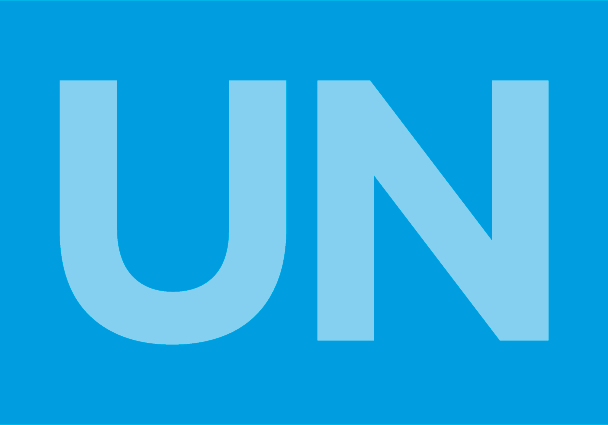
Jul 5, 2018 | Advocacy, Non-legal submissions
The ICJ and other NGOs today highlighted the need for the next UN High Commissioner for Human Rights to continue to maintain a strong voice and independent voice for human rights.
The statement was delivered by International Service for Human Rights (ISHR), on behalf of a number of NGOs, during a general debate at the UN Human Rights Council in Geneva. It read as follows:
“Thank you Mr. President,
We want to highlight key features for the next High Commissioner – the world’s premier human rights defender – whose mandate includes providing technical assistance and capacity building to States, as well as standing up for universal human rights and those who defend them.
The work of the next High Commissioner, and of human rights defenders more broadly, is essential to justice, fairness and dignity for all. Defenders contribute to sustainable and inclusive development. They combat corruption and the misuse of power. They promote good government, transparency and accountability. They seek to ensure that no-one gets left behind.
Despite this, around the world, defenders face mounting attacks and criminalisation for standing up to power, privilege, prejudice and profit. Their work has never been more important, nor more imperiled.
Mr President, it is in this context we say that the next UN High Commissioner needs to be a dedicated human rights defender. They need to be committed to working with and for human rights defenders; consulting and partnering with them, supporting their causes, and speaking out and protecting them when they are threatened or attacked.
The next High Commissioner needs to build strategic alliances with States, civil society, academics and business enterprises with a shared interest in human rights and the rule of law. They need to be fiercely independent, but also collaborative and capable of building influential partnerships and coalitions.
With the promotion, protection and realisation of human rights being linked to the attainment of peace, security and sustainable development, the next High Commissioner needs to be strongly supported by the UN Secretary-General and key UN agencies. Mr President, while the High Commissioner may be the UN’s premier human rights defender, it is time for the entire organisation to put human rights defenders up front.”
International Service for Human Rights
Cairo Institute for Human Rights Studies
Human Rights House Foundation
The International Lesbian, Gay, Bisexual, Trans and Intersex Association (ILGA)
CIVICUS
Peace Brigades International Switzerland
International Federation for Human Rights Leagues (FIDH)
Conectas Direitos Humanos
Asian Forum for Human Rights and Development (FORUM-ASIA)
West African Human Rights Networks
International Commission of Jurists (ICJ)










